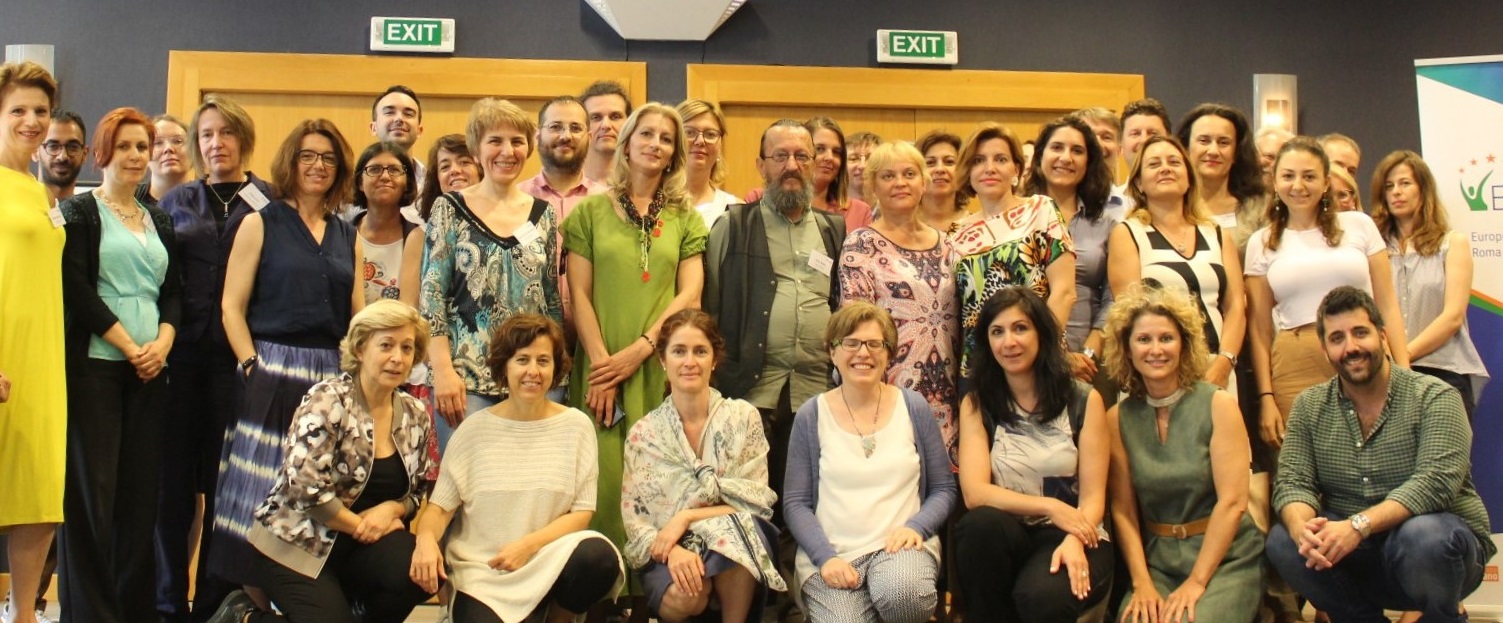
On 27-28 June 2019, the EURoma Network organised its first meeting of 2019 in Athens (Greece), hosted by Greek Network partners. The meeting brought together around 60 participants, representing Network partner organisations (public bodies responsible for ESI Funds and those in charge of Roma policies) from twelve countries, the European Commission (different Directorate-Generals) and the Network Technical Secretariat (Fundación Secretariado Gitano). The second day of the meeting was opened to some Greek organisations involved in interventions related to Roma inclusion and ESI Funds.
With a view to contributing to the improvement of the implementation of European Structural and Investment Funds (ESI Funds) to promote the social inclusion, equal opportunities and non-discrimination of the Roma population, the meeting aimed to:
- Review relevant EU developments as regards ESI Funds and Roma inclusion with a view to understanding the state-of-play and identify the scope of action for EURoma (EU level) and partners (national level). Particular attention was paid to the post-2020 Multiannual Financial Framework (MFF), notably ESF+ and ERDF Regulations, and the future of the EU Framework for National Roma Inclusion Strategies (NRIS).
- Exchange on the approaches and strategies to improve the living conditions of Roma of particularly disadvantaged contexts.
- Gain a better insight of the Greek context regarding the situation of Roma and how the main policies and ESI Funds address Roma social inclusion.
- Discuss the ongoing and upcoming EURoma Network activities and products.
Welcome and opening remarks
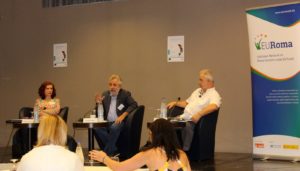 Ioannis Firbas, Director General of the National Coordination Authority, in charge of all ESI Funds in Greece, Dimitris Troulakis, Head of the ESF Actions Coordination and Monitoring Authority (EYSEKT), in charge of ESF interventions, and Katerina Giantsiou, Special Secretary on Roma Inclusion (Greek National Roma Contact Point), were in charge of opening the meeting on behalf of Greek Network partners.
Ioannis Firbas, Director General of the National Coordination Authority, in charge of all ESI Funds in Greece, Dimitris Troulakis, Head of the ESF Actions Coordination and Monitoring Authority (EYSEKT), in charge of ESF interventions, and Katerina Giantsiou, Special Secretary on Roma Inclusion (Greek National Roma Contact Point), were in charge of opening the meeting on behalf of Greek Network partners.
They briefly presented the organisations they represent and shared with participants some initial ideas about the Greek context as regards the situation of Roma population and how the policies of relevance for Roma inclusion and ESI Funds (notably ESF and ERDF) are contributing to address the situation (for further details on the Greek context, see section ‘Greek country monograph’)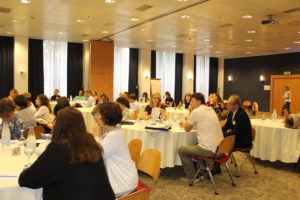 .
.
The Special Secretariat on Roma Inclusion (set up two and a half years ago) and the authorities in charge of ESI Funds, and notably ESF, are working hand in hand to make progress as regards Roma inclusion. One of the key priorities for action has been the eradication of the existing settlements and Roma neighbourhoods. Greek partners stressed the importance of networking and exchange among peers, as it is the case within the EURoma Network, as a crucial element for making progress and ensuring an effective use of the available resources.
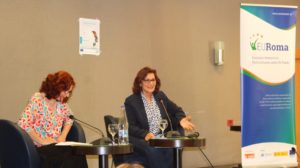 Theano Fotiou, Alternate Minister of Social Solidarity (Ministry of Labour, Social Security and Social Solidarity), responsible for the Special Secretariat on Roma Inclusion, joined the meeting at a later stage to welcome participants and reiterate the Greek government/Ministry’s commitment with Roma inclusion. Her participation showed the relevance given by Greek partners to the meeting and the participation in EURoma
Theano Fotiou, Alternate Minister of Social Solidarity (Ministry of Labour, Social Security and Social Solidarity), responsible for the Special Secretariat on Roma Inclusion, joined the meeting at a later stage to welcome participants and reiterate the Greek government/Ministry’s commitment with Roma inclusion. Her participation showed the relevance given by Greek partners to the meeting and the participation in EURoma
EU developments regarding ESI Funds and Roma inclusion
The meeting took place at a key moment in the discussions on the future of the EU frameworks for ESI Funds and for National Roma Inclusion Strategies (NRIS), which will end up in 2020. A large share of the meeting was devoted to understanding the current state-of-play and the next steps in the discussions and to identifying the opportunities for EURoma (EU level) and partners (national level) to contribute to them. The coincidence of the processes of negotiation of both the financial (ESI Funds) and the political frameworks (EU Framework for NRIS) offer an unprecedented opportunity for promoting an increased alignment between the political priorities and the financial resources.
Over the last years, EURoma has closely followed and contributed to the discussions and proposals on these two frameworks based on the Network partners’ experience and the ongoing reflection processes within the Network. To this end, it has elaborated several documents with proposals and has been actively involved in initiatives and events organised by European institutions and other relevant stakeholders.
Post-2020 Multiannual Financial Framework (MFF) and Roma inclusion: Looking at the negotiation and planning phases
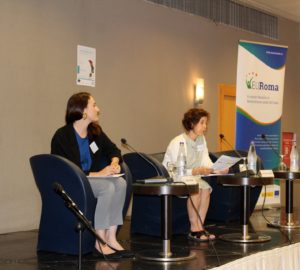 Teresa Epalza, European Commission- DG for Employment, Social Affairs and Inclusion (ESF and FEAD: Policy and Legislation), provided an overview of the current European Commission’s ESF+ proposal, identifying the main changes with regards to the previous period and the elements of relevance as regards Roma inclusion. The explicit mention to Roma in the Specific Objective (viii) ‘promoting long-term socio-economic integration of third country nationals and of marginalised communities such as the Roma’, the enabling condition on Roma and the horizontal principles of gender, equal opportunities, non-discrimination are among these elements.
Teresa Epalza, European Commission- DG for Employment, Social Affairs and Inclusion (ESF and FEAD: Policy and Legislation), provided an overview of the current European Commission’s ESF+ proposal, identifying the main changes with regards to the previous period and the elements of relevance as regards Roma inclusion. The explicit mention to Roma in the Specific Objective (viii) ‘promoting long-term socio-economic integration of third country nationals and of marginalised communities such as the Roma’, the enabling condition on Roma and the horizontal principles of gender, equal opportunities, non-discrimination are among these elements.
Ms. Epalza then focused on the state-of-play of the review/negotiations on the European Commission’s proposal by the European Council and the European Parliament as well as the negotiation and planning at national level, based on the Commission’s proposed investment priorities for the 2021-2027 Cohesion policy, presented in Annex D of the 2019 European Semester country-reports.
Finally she referred to the framework for partnership stressing that the European Code of Conduct on Partnership (ECCP) remains in force for the negotiations of the upcoming 2021-2027 programming period. For the post-2020 period, the ECCP is being reviewed, building upon the review carried out by the ESF Thematic Network on Partnership in 2017-2018.
Amendments put forward by the European Parliament regarding the European Regional Development Fund (ERDF)-Cohesion Fund proposal were also presented. The Parliament’s proposal to reincorporate the explicit reference to Roma (in line with ERDF article 7.2. in the 2007-2014 programming period), in a specific investment priority and a specific reference in the common outputs and result indicators would certainly contribute to using the potential of these funds to promote Roma inclusion.
EURoma and partners’ contribution
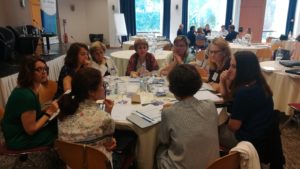 Building upon Ms. Epalza’s presentation, partners reviewed in working groups and in plenary how they are already taking part or plan to take part in negotiation and planning processes in their countries (e.g. launch events, internal discussions…) and how they consider they could further contribute to them (key moments and main inputs to be shared).
Building upon Ms. Epalza’s presentation, partners reviewed in working groups and in plenary how they are already taking part or plan to take part in negotiation and planning processes in their countries (e.g. launch events, internal discussions…) and how they consider they could further contribute to them (key moments and main inputs to be shared).
EURoma’s position paper on future ESF+ will be reviewed and updated in order to take into account the latest developments and in particular the amendments proposed by the European Council and the European Parliament.
EU Framework for National Roma Inclusion Strategies until and after 2020
The session started with a presentation by Dora Husz, of the Unit in charge of Roma coordination within the European Commission, Directorate-General for Justice and Consumers (DG JUST), on the reflection process on the current EU Framework for NRIS and its future once it concludes in 2020.
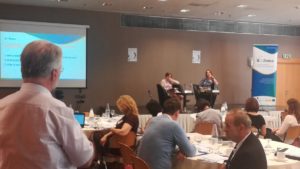 She referred to the main conclusions of the mid-term evaluation of EU Framework for NRIS released by the European Commission in December 2018 as well as the main policy learnings and priorities for implementation of Roma inclusion interventions at the national level identified within the framework of a separate process of analysis by the Commission.
She referred to the main conclusions of the mid-term evaluation of EU Framework for NRIS released by the European Commission in December 2018 as well as the main policy learnings and priorities for implementation of Roma inclusion interventions at the national level identified within the framework of a separate process of analysis by the Commission.
EURoma and partners’ contribution
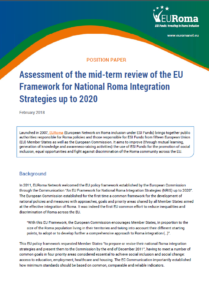 This initial input helped identify the next key steps and scope for action for EURoma (EU level) and partners (national level). As stated in its position paper ‘Assessment of the mid-term review of the EU Framework for National Roma Integration Strategies up to 2020’, EURoma recognises the added value of the EU Framework. However, it has not managed to achieve a real change in the lives of the many European Roma that still suffer from poverty, exclusion, inequalities and discrimination and cannot fully exercise, on an equal footing with other citizens, their citizenship. Therefore the importance of pursuing efforts and to this end, the maintenance of the EU Framework, although reformed, is essential.
This initial input helped identify the next key steps and scope for action for EURoma (EU level) and partners (national level). As stated in its position paper ‘Assessment of the mid-term review of the EU Framework for National Roma Integration Strategies up to 2020’, EURoma recognises the added value of the EU Framework. However, it has not managed to achieve a real change in the lives of the many European Roma that still suffer from poverty, exclusion, inequalities and discrimination and cannot fully exercise, on an equal footing with other citizens, their citizenship. Therefore the importance of pursuing efforts and to this end, the maintenance of the EU Framework, although reformed, is essential.
Other relevant EU Developments
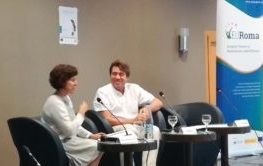 Dominique Bé of the European Commission, DG for Employment, Social Affairs and Inclusion, and EURoma Technical Secretariat shared with participants general information about a number of initiatives of relevance for EURoma/EURoma partners, notably:
Dominique Bé of the European Commission, DG for Employment, Social Affairs and Inclusion, and EURoma Technical Secretariat shared with participants general information about a number of initiatives of relevance for EURoma/EURoma partners, notably:
- Child Guarantee for vulnerable children. A key policy instrument given that more than a quarter of all children in the EU are at risk of poverty or social exclusion, among them many Roma, and that in its resolution on the ESF+, the European Parliament calls for the allocation of 5.9 billion for measures falling under this initiative and proposes that ‘Within the specific objectives for the social inclusion policy area (…) MS shall allocate at least 5% of their ESF+ resources (…) to targeted actions aiming at implementing the European Child Guarantee’.
- 2019 Country-specific recommendations (CSRs). 2019 proposed Commission’s recommendations for four countries (Bulgaria, Hungary, Romania and Slovakia) concern Roma.
- Reflection paper towars a sustainable Europe by 2030. The document refers on several occasions to Roma population.
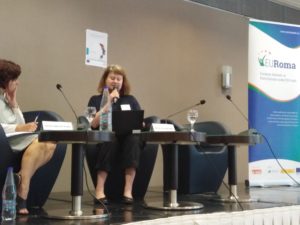 Finally, Katja Vauhkonen of the Finnish National Roma Contact Point shared with participants relevant information as regards the Finnish Presidency of the Council of the EU (July-December 2019) and Roma inclusion. Within the umbrella theme of ‘economy of wellbeing’ as a horizontal approach, Roma inclusion is addressed following a mainstreaming approach.
Finally, Katja Vauhkonen of the Finnish National Roma Contact Point shared with participants relevant information as regards the Finnish Presidency of the Council of the EU (July-December 2019) and Roma inclusion. Within the umbrella theme of ‘economy of wellbeing’ as a horizontal approach, Roma inclusion is addressed following a mainstreaming approach.
EURoma Network activities and products
The Technical Secretariat shared information about activities undertaken or planned by EURoma Network in the framework of the three lines of intervention agreed by partners:
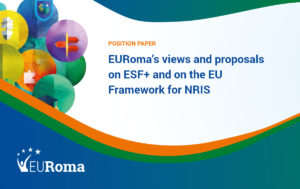 As part of its work to closely follow and contribute to the discussions and proposals on the post-2020 EU frameworks for Roma policies on the one hand and on ESI Funds, two position documents have been released over the past months:
As part of its work to closely follow and contribute to the discussions and proposals on the post-2020 EU frameworks for Roma policies on the one hand and on ESI Funds, two position documents have been released over the past months:
- Position paper on how the 2021-2027 European Social Fund Plus (ESF+) can better contribute to Roma inclusion and equality
- Reference document setting out the reasons why an explicit mention to the Roma community in the ESF+ Regulation is a necessary condition (although not sufficient) for addressing the unequal situation that Roma still face across the European Union.
EURoma Network updates (i.e. electronic newsletters, news alerts/flash updates) are also released, including information on relevant developments as regards Roma policies and ESI Funds as well as updates on Network activities and products. See latest newsletter
- Presence in relevant fora and initiatives of European institutions and organisations in connection with ESI Funds and Roma inclusion
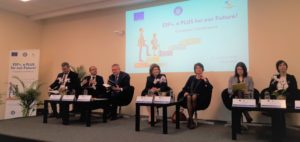 . Among others, EURoma Technical Secretariat and several partner organisations took part in the events of the Romanian Presidency of the EU on the EU Framework for NRIS and on the future European Social Fund Plus as well as in the fourth edition of the EU Roma Week, the Annual Convention for Inclusive Growth and the Annual Conference of the European Social Fund (ESF) Transnational Platform. EURoma’s Technical Secretariat also takes part in two European Commission’s consultative/expert groups (Structured Dialogue with Experts on ESI Funds of DG Regional Policy and the meetings with representatives of the civil society, international organisations and academics networks’ of DG Justice).
. Among others, EURoma Technical Secretariat and several partner organisations took part in the events of the Romanian Presidency of the EU on the EU Framework for NRIS and on the future European Social Fund Plus as well as in the fourth edition of the EU Roma Week, the Annual Convention for Inclusive Growth and the Annual Conference of the European Social Fund (ESF) Transnational Platform. EURoma’s Technical Secretariat also takes part in two European Commission’s consultative/expert groups (Structured Dialogue with Experts on ESI Funds of DG Regional Policy and the meetings with representatives of the civil society, international organisations and academics networks’ of DG Justice).
- Mutual learning and sharing of knowledge and experience among partners. In addition to the Management Committee meetings, regular actions to promote bilateral and multilateral exchange and cooperation between partners and between partners and external actors are promoted.
For further information on EURoma activities, please check EURoma website
Country monograph: Looking at the Greek case
Further to the initial ideas presented in the welcome and opening remarks, Greek Network partners shared more detailed information on Greek context as regards the situation of Roma and how policies and ESI Funds are addressing their situation building upon the presentations made by Greek Network partners.
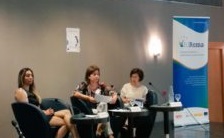 Alexandra Karagianni, Legal Expert and Scientific Collaborator of the Special Secretariat on Roma Inclusion (Greek National Roma Contact Point) provided an overview of the situation of Roma in Greece in fields such as employment, education, health and housing. She then referred to the Greek National Roma Inclusion Strategy 2012-2020, which has been translated into the regional level (in regional strategies or in special chapters in the regional strategies). She concluded by reviewing the main challenges faced and the opportunities ahead.
Alexandra Karagianni, Legal Expert and Scientific Collaborator of the Special Secretariat on Roma Inclusion (Greek National Roma Contact Point) provided an overview of the situation of Roma in Greece in fields such as employment, education, health and housing. She then referred to the Greek National Roma Inclusion Strategy 2012-2020, which has been translated into the regional level (in regional strategies or in special chapters in the regional strategies). She concluded by reviewing the main challenges faced and the opportunities ahead.
Maria Zampeli, of the ESF Actions Coordination and Monitoring Authority (EYSEKT), shared information on how the ESI Funds and notably the ESF are contributing to the implementation of the actions planed in the NRIS. ESI Funds provide support, in complementarity with national resources, for mainstream and targeted measures related to the four fields of the Strategy and following a long-term/holistic approach. Roma inclusion is considered in Operational Programmes at national and regional level.
Approaches and strategies to improve the living conditions of particularly disadvantaged contexts
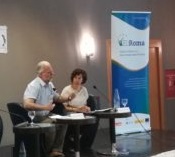 This session started with a general analysis of the topic from a general point of view made by Ioannis Dimitrakopoulos of the European Union Agency for Fundamental Rights (FRA) based on the experience and work of the Agency. Mr. Dimitrakopoulos recalled that addressing the situation of the many Roma that still live in the fringes of society is a human-rights issue as established by international and EU treaties, which lay down specific duties for administrations at all levels in European countries.
This session started with a general analysis of the topic from a general point of view made by Ioannis Dimitrakopoulos of the European Union Agency for Fundamental Rights (FRA) based on the experience and work of the Agency. Mr. Dimitrakopoulos recalled that addressing the situation of the many Roma that still live in the fringes of society is a human-rights issue as established by international and EU treaties, which lay down specific duties for administrations at all levels in European countries.
He also called on participants to keep the momentum offered by the current valuable EU framework and to promote partnerships that allow linking Roma inclusion and human rights (e.g. ombudsmen, equality bodies…) and translating human rights on the ground.
Reflections from national/local level experiences
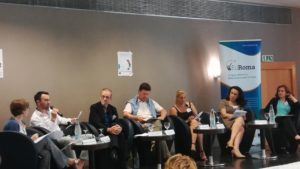 After this initial input, representatives of three partner countries were invited to reflect, based on their national experiences, on how they are addressing the situations of Roma in particularly disadvantaged contexts. They referred to aspects such as the approaches and strategies they are using, the main challenges faced and possible solutions and failures/mistakes and lessons learnt that could be relevant to other contexts. They ended up by pointing out to key elements and recommendations that would be worth considering, both in general and in relation to the upcoming programming period.
After this initial input, representatives of three partner countries were invited to reflect, based on their national experiences, on how they are addressing the situations of Roma in particularly disadvantaged contexts. They referred to aspects such as the approaches and strategies they are using, the main challenges faced and possible solutions and failures/mistakes and lessons learnt that could be relevant to other contexts. They ended up by pointing out to key elements and recommendations that would be worth considering, both in general and in relation to the upcoming programming period.
Partner countries invited to share their reflections were as follows: Greece (represented by Katerina Giantsiou, Special Secretary on Roma Inclusion, as National Roma Contact Point); Hungary (represented by János Zoltán Szabó of the Managing Authority of the National Human Resources Development OP (ESF/ERDF) and Tamás Szondy of the Deputy State Secretariat for Social Inclusion (National Roma Contact Point); and Slovakia (represented by Matej Mikuska, Intermediate Body of the National Human Resources OP (ESF/ERDF)).
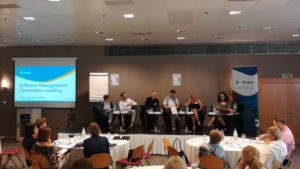 In addition, representatives of two Greek municipalities involved in interventions, funded by ESI Funds, to address the situation of the Roma settlements in their constituencies shared their experiences and views from their local perspective. These were the municipality of Halandri, represented by Eleni Desiotou, and the municipality of Farsala, represented by Kyriaki Panagiotopolou. Their experiences as regards temporary relocation or the rent subsidy mechanism, which are combined with others related to employment, education…, serve to illustrate how ESI Funds work in practice.
In addition, representatives of two Greek municipalities involved in interventions, funded by ESI Funds, to address the situation of the Roma settlements in their constituencies shared their experiences and views from their local perspective. These were the municipality of Halandri, represented by Eleni Desiotou, and the municipality of Farsala, represented by Kyriaki Panagiotopolou. Their experiences as regards temporary relocation or the rent subsidy mechanism, which are combined with others related to employment, education…, serve to illustrate how ESI Funds work in practice.
Elements considered important to successfully improve the living conditions of particularly disadvantaged contexts include:
- The availability of enough financial resources (European and national) and their effective use;
- The combination of different ESI Funds (particularly ESF and ERDF) in order to allow the combination of housing/infrastructure interventions with social support measures throughout the whole intervention process;
- The connection between the priorities of the ESI Funds and the National Roma Inclusion Strategies;
- The combination of holistic and sectorial approaches;
- The eligibility of relevant expenses for the development of adequate interventions (currently expenses such as buying housing is not eligible);
- The involvement and strong commitment of relevant actors (i.e. authorities in charge of the funds, National Roma Contact Points, local councils, community, leaders…). Particular attention should be paid to the political commitment and willingness of local authorities;
- The mobilisation (at political level and others) of Roma communities themselves to push for these interventions;
- The promotion of a change in the social perception of non-Roma inhabitants so that they do not block the interventions;
- The importance of showing positive results and projects;
- The need to address bureaucratic problems, such as the lack of legal documents, which may prevent them from benefitting from the interventions.
Participants agreed that one of the big challenges is to address these complex situations, with a large scope and involving a high number of people, by developing interventions that do not perpetuate concentration/segregation and that follow the principles that have proven successful (e.g. relocation in mainstream neighbourhoods, using dispersion models, individualised plans based on individual needs…).
In this sense, it was pointed out that, if needed, immediate interventions in the disadvantaged context to dignify the living conditions of the inhabitants should not be an end in themselves and should be combined with other medium-long term actions/interventions aimed to look for sustainable solutions.
It was agreed that these complex situations require long-term and intensive interventions (in terms of scale, funds and human resources). We should now ensure that the EU framework for ESI Funds currently being negotiated includes all the elements that would allow to develop successful interventions (e.g. eligibility of private funding) and that it is linked with the policy framework on Roma inclusion.
For further information, please contact EURoma Technical Secretariat.

